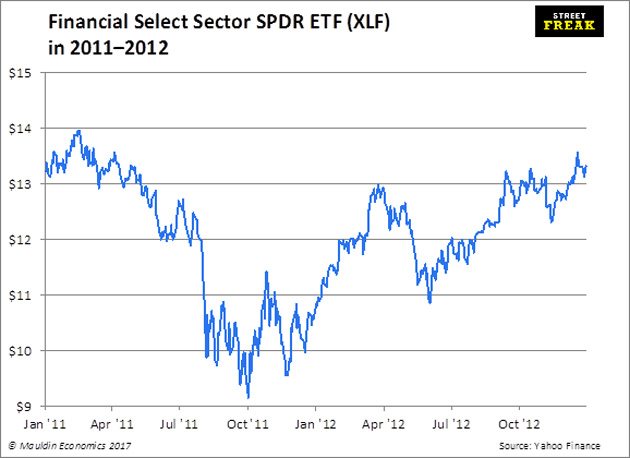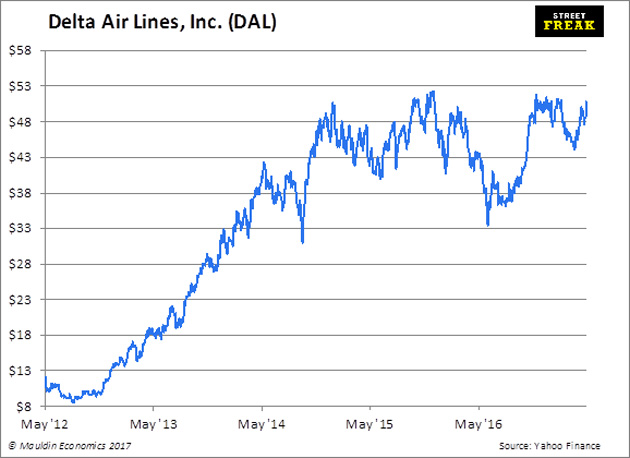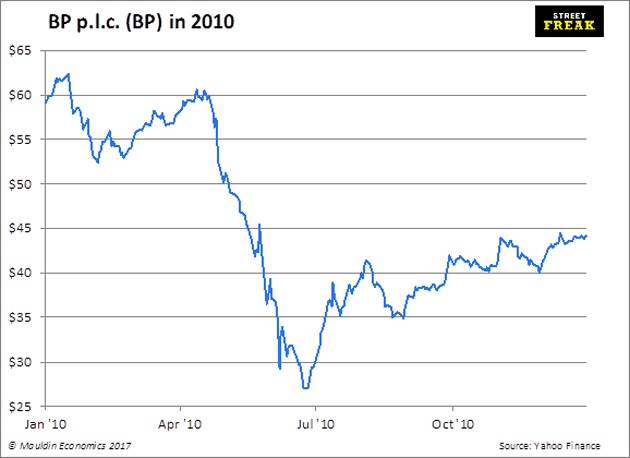| -- | June 1, 2017 Occupy Airlines  SIC was terrific this year. I was less hardheaded than last year, so actually learned a few things. And though it’s unlikely to happen, I’d love to have Matt Ridley come back every year until 2037. A few pictures were snapped to prove I was actually there. The photographer got me onstage, catching flies, interrogating David Zervos of Jefferies about his Bondfire hats.  Also, I DJed the Tuesday night cocktail reception, and managed to record about half of the three hour set. You can check it out here. And if you want to check out the rest of the SIC (DJ set not included), you might want to think about picking up a Virtual Pass. What I want to talk about today is airlines. I’m a longtime airline bull, going all the way back to 2012-2013—long before it was fashionable. I liked airlines because everyone hated them. Especially Warren Buffett, who once said that someone should have shot Orville and Wilbur out of the sky. He now owns the stocks. A pilot wrote a great article in The New York Times saying that the conventional wisdom about airlines (which is that they suck) is all wrong. People like to talk about the golden age of flying, with three-course meals, plenty of room to stretch out, people wearing ties, the piano bar in 747s… all that jazz. But there was no golden age of flying. In fact, the golden age of flying is now. Read for yourself. Flying today is: - Massively cheaper—prices are down over 50% in real terms.
- Way more convenient—there are flights pretty much wherever you want to go.
- Safer—there hasn’t been a crash by a major airline in the US in 15 years.
- Greener—planes were louder, less fuel-efficient, and more polluting.
- Smoke-free—people used to smoke! Today, that would be intolerable.
- Fun—there’s enough entertainment, with in-flight wifi, unlimited movies, etc.
- Still pretty roomy—there’s a little less space than there used to be, but not as bad as people think.
This is yet another example of people being habitually sullen and taking things for granted. Flying is pretty awesome. As Louis C.K. said: “You’re in the sky…in a chair!” But didn’t United Airlines just throttle a guy and drag him off the plane? Didn’t a flight attendant from another airline try to start a fight with a passenger? Didn’t Spirit Airlines customers start a riot at the ticketing desk in Fort Lauderdale? There is a phenomenon in social psychology—I don’t know if there is a name for it1—but when you see something in the news, like a passenger being mistreated, chances are you going to see that over and over again for months, until the news people get bored and move on to something else. Based on the newsflow, you might be led to believe that airlines beat up their passengers all the time, and that flying commercial is some kind of dystopian hell. Certainly some aspects of it are less pleasant than they used to be, and a lot of that has to do with airport security. But if I had one beef with flying nowadays, it is that people don’t really look after their appearance, and might want to lean a little closer to the deodorant. And that doesn’t have anything to do with the airlines.  Occupy XLF One of the really great trades in The Daily Dirtnap was back in 2011 when Occupy Wall Street happened. Oh, I remember that clearly—it coincided almost perfectly with when Street Freak (the book, not the newsletter) came out. Sentiment towards banks and bankers is still pretty bad, but it reached a low point in 2011. I remember thinking… if everyone hates banks, then banks are probably going to… rally!  In fact, it was a massive rally. I called the trade “Occupy XLF” at the time. Occupy Wall Street pretty much marked the lows in financials. It always works out that way. Airlines aren’t on the lows, but I can tell you that when everyone hates airlines… airlines are probably going higher.  Want another example of how this works? Remember Deepwater Horizon? The BP oil leak in the Gulf of Mexico?  The explosion happened on April 20, 2010, and the leak was capped in July. Remember how angry people were at oil companies? Yup. The Occupy BP trade. Airlines Are Big Businesses Airlines have been such horrible stocks for so many years that people have completely forgotten that they can be… not horrible. There was actually a time where there was speculation that United Airlines would be taken private in a leveraged buyout (LBO) in the late eighties, sending the stock into space. Of course, that was peak private equity stupidity, because an airline is about the worst possible business to LBO. But it shows how drastically different sentiment can be from one decade to the next. Let’s play the market cap game. American Airlines is the largest airline in the world (by routes). What do you think the market cap is? Dum dum da… $23 billion. eBay is $37 billion. eBay is where old people sell baseball cards. I don’t know, guys. Airlines are not special. They have the ability to be wildly profitable, like any other business. Now that there are only four major American carriers, my guess is that they have some pricing power. And fares have come up a bit—and they will come up more. And you will pay them—because you are getting richer, and because they are still very low in real terms. It would have been nice if Buffett was bullish in 2013, but he’s no dummy. It’s not hard to see the potential here.
_____
1 It’s a bit like Baader-Meinhof, but not exactly. 
Jared Dillian
Editor, The 10th Man
 | Get Thought-Provoking Contrarian Insights from Jared Dillian
Meet Jared Dillian, former Wall Street trader, fearless contrarian, and maybe the most original investment analyst and writer today. His weekly newsletter, The 10th Man, will not just make you a better investor—it's also truly addictive. Get it free in your inbox every Thursday. |
Jared's premium investment service, Street Freak, is available now. Click here for our introductory offer. Jared Dillian, former head of ETF Trading at one of the biggest Wall Street firms and author of the highly acclaimed books, Street Freak: Money and Madness at Lehman Brothers , and All the Evil of This World , shows you how to pick and trad e trends, and master your inner instincts. Learn how to use “Angry Analytics” as a leading indicator of budding trends you can profit from… and how to view any market situation through the lens of a trader. Jared’s keen insight into market psychology combined with an edgy, provocative voice make Street Freak an investment advisory like no other. Follow Jared on Twitter at @dailydirtnap. Share Your Thoughts on This Article
 http://www.mauldineconomics.com/members
Use of this content, the Mauldin Economics website, and related sites and applications is provided under the Mauldin Economics Terms & Conditions of Use. Unauthorized Disclosure Prohibited The information provided in this publication is private, privileged, and confidential information, licensed for your sole individual use as a subscriber. Mauldin Economics reserves all rights to the content of this publication and related materials. Forwarding, copying, disseminating, or distributing this report in whole or in part, including substantial quotation of any portion the publication or any release of specific investment recommendations, is strictly prohibited.
Participation in such activity is grounds for immediate termination of all subscriptions of registered subscribers deemed to be involved at Mauldin Economics’ sole discretion, may violate the copyright laws of the United States, and may subject the violator to legal prosecution. Mauldin Economics reserves the right to monitor the use of this publication without disclosure by any electronic means it deems necessary and may change those means without notice at any time. If you have received this publication and are not the intended subscriber, please contact service@mauldineconomics.com. Disclaimers The Mauldin Economics website, Yield Shark, Thoughts from the Frontline, Patrick Cox’s Tech Digest, Outside the Box, Over My Shoulder, World Money Analyst, Street Freak, Just One Trade, Transformational Technology Alert, Rational Bear, The 10th Man, Connecting the Dots, This Week in Geopolitics, Stray Reflections, and Conversations are published by Mauldin Economics, LLC. Information contained in such publications is obtained from sources believed to be reliable, but its accuracy cannot be guaranteed. The information contained in such publications is not intended to constitute individual investment advice and is not designed to meet your personal financial situation. The opinions expressed in such publications are those of the publisher and are subject to change without notice. The information in such publications may become outdated and there is no obligation to update any such information. You are advised to discuss with your financi al advisers your investment options and whether any investment is suitable for your specific needs prior to making any investments.
John Mauldin, Mauldin Economics, LLC and other entities in which he has an interest, employees, officers, family, and associates may from time to time have positions in the securities or commodities covered in these publications or web site. Corporate policies are in effect that attempt to avoid potential conflicts of interest and resolve conflicts of interest that do arise in a timely fashion.
Mauldin Economics, LLC reserves the right to cancel any subscription at any time, and if it does so it will promptly refund to the subscriber the amount of the subscription payment previously received relating to the remaining subscription period. Cancellation of a subscription may result from any unauthorized use or reproduction or rebroadcast of any Mauldin Economics publication or website, any infringement or misappropriation of Mauldin Economics, LLC’s proprietary rights, or any other reason determined in the sole discretion of Mauldin Economics, LLC. Affiliate Notice Mauldin Economics has affiliate agreements in place that may include fee sharing. If you have a website or newsletter and would like to be considered for inclusion in the Mauldin Economics affiliate program, please go to http://affiliates.ggcpublishing.com/. Likewise, from time to time Mauldin Economics may engage in affiliate programs offered by other companies, though corporate policy firmly dictates that such agreements will have no influence on any product or service recommendations, nor alter the pricing that would otherwise be available in absence of such an agreement. As always, it is important that you do your own due diligence before transacting any business with any firm, for any product or service. © Copyright 2017 Mauldin Economics | -- |
